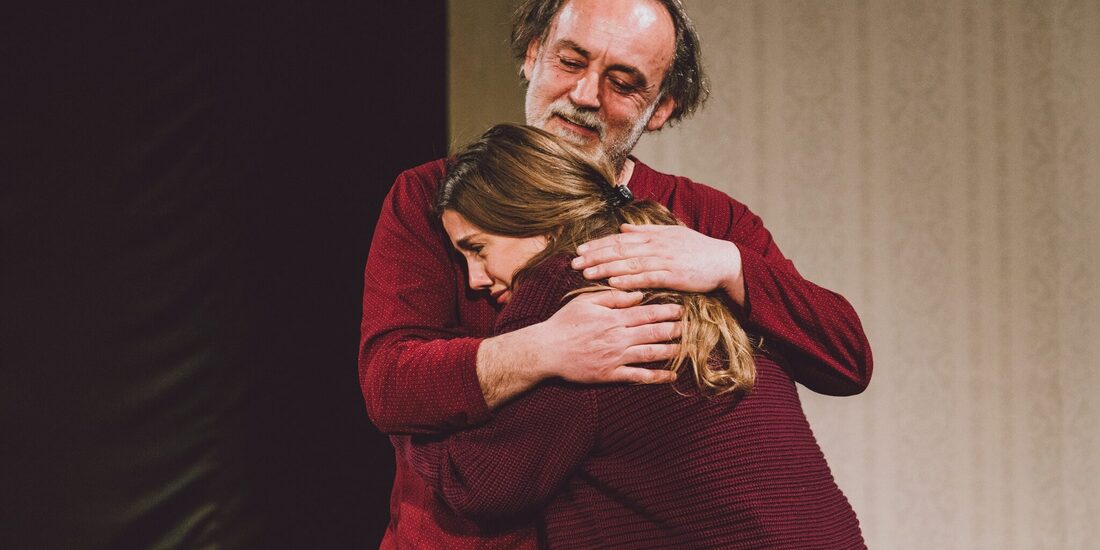|
Reviewed by Belkisa Zhelegu What if your memories get messed up, or even worse, what if they disappear? How painful would it be not to remember who you are? Dementia, as both a tragic illness and a loss of self over time, are the two key elements of the show Arbri inspired by Florian Zeller's film The Father.
Through complex scenes, director and adaptor Lirak Çelaj gave the public a view of how an individual turns into a 'nobody' when dementia affects his brain. In essence, the show has a very simple plot. It tells the story of an elderly widower, a war survivor, and his eldest daughter who is facing the big dilemma of whether to stay in Kosovo to take care of her sick father or continue her life abroad. Even though the play is focused on this dilemma, its narrative and structure are like a reverse puzzle: where the whole picture slowly deforms, in the same way as Arbri's identity. This is also true of the production’s set changes and the marvelous way in which Arbri’s house is transformed into an asylum… piece by piece, creating the atmosphere of a memory game. The play's adaptation for a Kosovar reality, indirectly hitting the government policies for the war’s survivors but at the same time judging people’s mass "dementia" for the macabre events during the war - the young doctor / the girl's husband mocked Arbri every time he mentioned being a honored soldier - were two very strong points of the show, opening up another dimension of the text. Another painful issue raised by the show is violence against the frail, as we see the violence of the nurse in the asylum against the old man. The old man's illness had made him forget that one of his daughters died in the war and he constantly wants to contact her, while he occasionally scolds his other daughter, the one who is taking care of him, by comparing her attitude to his dead wife in a negative way. His relationship with his wife could have been developed more deeply, since the partner can sometimes (though not necessarily) play an essential role in overcoming the other partner's traumas. Small fragments let the audience understand that there was a lack of communication between them, but it is still not enough to clearly understand how Arbri had reached this critical state and how much influence the relationship with her wife or her death had on him. Also, his displeasure with the caretakers that the daughter employed shows quite clearly his need to have his family close to him, and if one of the daughters had died and the other daughter was quite busy, then his only family would have been his wife, so the show seems truncated without the dead wife being discussed or evoked in any scene. Even at the end of the play, when the old man loses it completely, he calls out to his mother, a sign that his identity is destroyed and as a small child he needs his mother to remind him who he is. Although the scene is quite painful, there should have been a growing exponent to bring him to this stage, At first, he didn't want a nurse or a caretaker but only his daughters; at one point he had to need his wife, and finally when he realizes that every person in this world stays with you for some interest, he looks for the mother who loves you unconditionally. Within the framework of the play, the main dilemma of the daughter to take her father to a nursing home was an even bigger drama than her father's illness. This dilemma seems to have affected her romantic relationships as well. Perhaps her father often forgot the fact that she was divorced because he felt somehow guilty and a burden on her. Although the performance of Shkumbin Istrefi in the role of the father was impressive, the acting of the father -daughter relationship was generally organic, but in some cases the two performers lacked an emotional connection with each other; and this fact affected in the old man’s interpretation, sometimes finding himself enforcing/ imposing the emotion. Also, in my view, the show's rhythm needed to be faster because, apart from the fact that there were many repetitive scenes, the scenes had to come faster in order not to become tiring for the audience. One phrase was mentioned often and deliberately during the show, "this disease has no improvement, on the contrary, it will get worse". The clock, which always marked 11:55 A.M. throughout the show, was an indicator of how the father's condition did not change or improve, but simply went back to point 0, regardless of the efforts of the daughter, the caregivers or the doctors. And the fact that he often blamed others for stealing his watch served as a parallel for his inferiority to others, trying to blame them for the strange situations that were happening to him. Regardless of the fact that the end is sad, it serves to enforce the main idea of not creating illusions in curing the disease, but the lack of communication addressed during the show is a strong alarm to remind the audience how delicately such situations should be handled and the importance of the role of family.
0 Comments
Leave a Reply. |
Kosovo Theatre ReviewsReviews and creative responses to theatre productions in Kosovo Archives
November 2022
Categories |

 RSS Feed
RSS Feed
